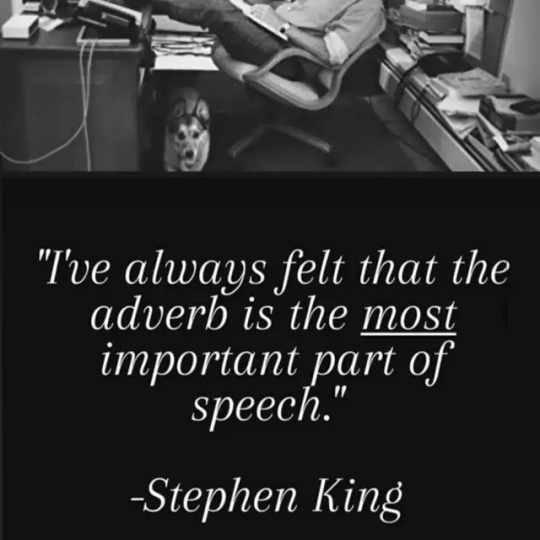#Adverbs
Text
I know adverbs are controversial, but "said softly" means something different than "whispered" and this is the hill I will die on.
#books#writing#writersnetwork#writers#writers on tumblr#writing community#author#writerscommunity#writers life#creative writing#writer#writers of tumblr#adverbs
117 notes
·
View notes
Text

"Adverbs pave the road to hell."
-- Stephen King
I have this written on a tiny spiral notepad next to my desk just in case I need reminding.
#adverbs#writing#writers#writers on tumblr#writing community#writerscommunity#writer things#writerslife#novel writing#writers and readers#writing tips
326 notes
·
View notes
Text
Negations 101
I don’t like cheese - Je n’aime pas le fromage
I don’t like cheese anymore - Je n’aime plus le fromage
I’ve never liked cheese - Je n’ai jamais aimé le fromage
I don't like cheese yet - Je n'aime pas encore le fromage
I still don't like cheese - Je n'aime toujours pas le fromage
I don't always like cheese - Je n'aime pas toujours le fromage
I don't like cheese that much - Je n'aime pas tant que ça le fromage
I don't necessarily like cheese - Je n'aime pas forcément le fromage
(I only like cheese) - Je n’aime que le fromage
I will never like cheese again - Je n'aimerais plus jamais le fromage
I don’t like cheese nor bread - Je n’aime ni le fromage ni le pain
None of my friends like cheese - Aucun de mes amis n’aime le fromage
I like no one - Je n’aime personne
I like nothing - Je n’aime rien
I never like anything - Je n'aime jamais rien
I no longer like anything - Je n'aime plus rien
He is nowhere - Il n’est nulle part
There’s nothing to do - Il n’y a rien à faire
I don’t see anyone - Je ne vois personne
I can't see him - Je n'arrive pas à le voir**
I see no solution - Je ne vois aucune solution
I never do anything - Je ne fais jamais rien
Don’t go! - Ne pars* pas / Ne partez pas
Don’t go there! - N’y va pas
*We use Partir rather than Aller which is a transitive verb i.e. requires an object (I'm leaving is an acceptable sentence but I'm going is considered unfinished).
**We don't use Pouvoir (to be able to) as it would refer to one's physical ability to see. My eyes are functional, I just can't spot people.
Learn more about "Ne".

414 notes
·
View notes
Text


Schoolhouse Rock (1973), "Lolly, Lolly, Lolly, Get Your Adverbs Here"
#my gif#Schoolhouse Rock#1973#1970s#lolly lolly lolly get your adverbs here#gif#gifs#gifset#animation#cartoons#vintage#television#vintage television#adverb#adverbs
385 notes
·
View notes
Text
Norwegian can modify expressions by using a wide selection of short adverbs with little or no stress, that can express doubt, politeness, irritation, etc. How you use these adverbs is one of the things that will indicate your degree of mastery/understanding in Norwegian.
The lady's marital status in the examples below doesn't actually change, the adverbs merely indicate what the speaker believes that status to be:
Hun er sikkert gift. I'm sure she's married.
Hun er nok gift. She's probably married.
Hun er vel gift. I'd guess she's married.
Hun er visst gift. I've heard she's married.
Hun er kanskje gift. Maybe she is married.
Hun er neppe gift. I doubt she's married.
These unaccented adverbs have a fairly regular position in the sentence, they follow immediately after the verb. The same adverb can sometimes indicate slightly different nuances of meaning, depending on tone of voice and the context. Click the link for each one for more information.
From Exploring Norwegian Grammar by Kirsti Mac Donald and Marianne MacDonald.
133 notes
·
View notes
Text
me trying to decide which adverb to overuse

#it’s a bad habit… but#adverbs are my best friends#is it a “just” or an “absolutely” kind of day?#adverbs#english#english major problems
20 notes
·
View notes
Text
Watching Phantom Thread and wondering whether "mycologically," as in "Alma is about to put Reynolds in his place mycologically," is an actual word.
7 notes
·
View notes
Text
en attendant
/En AhTenDen/
-> meanwhile / in the meanwhile, literally "while waiting"
~ Je sors peut-être beaucoup, mais en attendant, j'ai toujours des bonnes notes aux examens.
~ I may go out a lot, but in the meanwhile, I always get good grades in my exams.
#Adverbs#langblr#french langblr#french#french language#french learning#studyblr#french vocab#langblog#french vocabulary#french words
26 notes
·
View notes
Text
For a while in college I was an experimental filmmaker, if that’s the word for it. We’d get drunk and rip up pages in the Norton Anthology of Poetry and read them into her dad’s video camera in funny voices. There was no point to it, but we loved those movies to tears. They were for a select audience, but then again we were the Chosen People.
— adverbs
We made a standing date for any Saturday night when we didn’t have something absolutely fabulous to do–then the two of us would do something, just us. All we needed was each other, we decided. Flan and Natasha were all Flan and Natasha needed. Sure, the other Eight were wonderful people, but we, we were the stuff of kings.
— the basic eight
11 notes
·
View notes
Text


No truer words have ever been spoken 🙏
I just know how much he loves to use words like literally and very and actually and totally. And in phrases like she sadly wept and she gladly wept and so on
Such a master🙏
Go forth and use all those adverbs y'all!
#stephen king#on writing#adverbs#We all contain multitudes#blessings and riches#🙏#schoolhouse rock#schoolhouse Rock adverbs
8 notes
·
View notes
Text
The difference between ‘byth’ and ‘erioed’ (Y gwahaniaeth rhwng ‘byth’ ac ‘erioed’)
Both mean ever/never, 'ever' in a question, never in negatives, replacing ‘ddim’ where it would occur in such a sentence. But they differ in which tense each can be used.
erioed/byth -> ever/never (adverb)
byth bythoedd/yn oes oesoedd -> for ever and ever (just an idiomatic phrase)
“Dwi ddim yn meddwl amdano fe.” I don't think about it.
Alternatively, you could use ddim, and then tack on byth/erioed at the end of the sentence.
Tenses and usage (Amserau a defnydd)
Erioed is used in “completed tenses in the past”, the present perfect, simple past and pluperfect (past perfect) tenses, replacing ddim in the negative.
“Dwi erioed wedi meddwl amdano fe.” I have never thought about it.
“Dwi ddim wedi meddwl amdano fe erioed.” [Present perfect]
“Wnes i erioed feddwl amdano fe.” I never thought about it.
“Wnes i ddim meddwl amdano fe erioed.” [Simple past]
*Note: Eriod, unlike ddim, does not prevent the soft mutation from occurring. “Wnes i ddim meddwl”, ond “wnes i erioed feddwl”.
“Do'n i erioed wedi meddwl amdano fe.” I had never thought about it. [Past perfect]
Byth is used with all other tenses: present, future, imperfect (past continuous), conditional.
“Dwi byth yn meddwl amdano fe.” I never think about it. [Simple present]
“Fydda i byth yn meddwl amdano fe!” I will never think about it! [Future]
“Do'n i byth yn meddwl amdano fe.” I was never thinking/never used to think about it. [Imperfect]
“Faswn i/fyddwn i byth yn meddwl amdano fe.” I would never think about it. [Conditional]
Erioed is an interesting word in its etymology, Wiktionary (fy ffrind gorau yn y byd, yn wir) says it comes from er (like ers, meaning since) + ei (3rd person singular basically) + oed (time, age). Literally ‘never’ = ‘since their time’.
If you've never had ice-cream, ti erioed wedi cael hufen-iâ, you've never had ice cream since your time (on earth, presumably), though why you wouldn't have ice cream ever is beyond me. Dwi'n mynd i fwyta hufen iâ nawr, in fact. Fel trît :)
(On the other hand, byth shares a root with the word ‘byd’, meaning ‘world’ but also used in the negative sense with dim to mean nothing: dim byd. Maybe it's the way French uses the word 'monde' meaning world, where ‘tout le monde’, literally the whole world, just means ‘everyone’ (dramatic much!), but I am just thinking out here.
I think about it because it makes it easier to remember the Welsh structure when I've seen these structures before elsewhere, helps me get comfortable with them far quicker than if I were starting from scratch, but also because these sort of structures where you use two words to form a negative, and the word that actually carries the negative notion gets dropped in favour of the word that sticks out to us the most, which may even carry the positive notion, has been around for a while in a few languages!
English had a similar thing way back when (the reason this is under a Keep Reading is because it's 2 AM and so I might be getting stuff wrong here, but I think the 'way back when' in question was Middle English. Don't want to feed anyone lies though! I'll double check that with a history of English/linguistics textbook later), when the structure for an English negative was "[subject] ne [conjugated verb] not". ‘I ne saye not’ was how you'd say that you don't say. The ‘ne’ dropped off in time, and over time ‘do’ joined the ‘not’ and moved to the front giving us ‘I do not say, and ‘not’ is sufficient to convey negation.
French currently has the Middle English structure: ‘Je ne dis pas.’ In colloquial French, you do see the 'ne' dropping off too, 'je dis pas' is understood to mean the same and pas in itself is sufficient to convey negation.
In Welsh, ‘dim byd’ means nothing, but ‘dim’ initially just meant ‘a thing’ in Old Welsh, and ‘dim byd’ was closer to ‘anything’ than ‘nothing’ (Wiktionary implies it might've come from something along the lines of “a thing of the world”, whereas it now seen as “nothing (of) the world”) , and there was an old word at the beginning of the sentence to convey the negation when it was used in this way to mean nothing.
(A word which, because it is 2 AM I cannot for the life of me be sure of getting right. But similar to how other negative verbs like 'dwyt/dydy/dyw', 'does' etc. came to acquire their 'd's from the negative word 'nid' that would go before them, while 'wyt/ydy/yw/oes' retained their usual non-negative notions, dim had something too, but I can't remember.
“Nid oes dim byd yma” literally just meant “there isn't (nid -> not) anything here”, and that just became “Does dim byd yma”.)
Some digging around tells me that this is called ‘semantic bleaching’.
Anyway, what was all this about? Byth, it comes from the Old Irish word meaning world. And that's that! (...along with potential mistakes)
#grammar#vocabulary#dysgu cymraeg#learn welsh#sentences#source: duolingo#source: wiktionary#byth#erioed#adverbs#welsh#cymraeg#langblr#language learning#just read a comprehensive breakdown of it on Duolingo and Wiktionary and wanted to write it down somewhere before it stopped making sense t#me. Figured I may as well post it publicly since I'd written it all!#idiomatic expressions
19 notes
·
View notes
Note

ive only had quill for a chapter and half but im already in love with him????
🤣🤣
It is very hard to be suspicious of someone who expends emotional energy being annoyed at adverbs.
38 notes
·
View notes
Note
hey, could you write a few sample sentences using the word "persino"? i don't really get it :(
thanks <3
Ciao :)
"Persino", "perfino" (same word) and "addirittura"* are adverbs that work the same as "even". Gonna focus on the first two and leave you a link for the third one despite ofc the meanings are the same.
You basically use perfino/persino when there's a situation that turned out to be a bit too exaggerated compared to what it looked like to start with. Maybe you renounce to something you like or wanna do in order to avoid something else or someone; maybe you go somewhere you don't like in order to see/meet someone you like; maybe you do something you don't like to do to make someone else happy or to gain something...
I suggest you to read these two posts (conditional, ending part | addirittura*) cause I mention these adverbs there too, but I'll probably add the same things here (but especially the second link, may give you a further insight, as I mentioned above).
Anyway, as you asked, let's see some examples.
1) Lucia è persino uscita prima pur di non incontrare Daniele = Lucia went even out earlier in order to not meet Daniele.
(Lucia doesn't really like Daniele for whatever reason, so she decided to go out from her house/office/sny place earlier than she was supposed to -maybe she had something to do as well but she rather went out earlier anyway- to not meet him)
2) Ho perfino messo la cravatta! = I even put on a tie!
(The person speaking doesn't really like to wear ties but it may be a special occasion so they decided to put on one, despite they don't like it, and they're pointing this out either to claim a praise or to stress how much they care about this event)
3) Sono perfino andata in piscina per incontrarlo! = I even went to the swimming pool to meet him!
(This is someone who may have a crush on another person and in order to meet them, they decided to go to the swimming pool which may be a place they really don't like either cause they cannot swim or for any other reason like they don't like wearing a swimsuit or there're too many people.... Let's not judge the stalking level of this sample, it's only again to give you an idea of the use of "perfino/persino" aka what you're able to do/afford in order to get something)
I hope these can be enough for you to get it. If not, feel free to ask for more examples :) Or you can try to send one or two of your own so you can check if you really got it :)
#it#italian#langblr#italiano#italian language#italian langblr#language#languages#parole words#traduzioni#italian grammar#lingua italiana#grammatica grammar#grammatica italiana#adverbs
13 notes
·
View notes
Note
Bonjour! I hope this finds you in good health. I was wondering if you might be so kind as to help me understand something that puzzles me even after 4 years of French––même. It feels like it appears in every sentence, even if it doesn't seem like the word "same" really belongs. In that same vein, if I may take up a bit more of your time, is there nothing more to knowing when to use mon/mes/ma than gender? I feel like I can never simply say "my;" it is always somehow terribly incorrect. Merci!
Hello,
Même means:
Same when it's an adjective (J'ai le même pull),
Even though if placed in front of If (Je l'aime même s'il est toujours en retard)
Itself (or a sibling) when placed after a tonic pronoun (Moi-même)
Very when placed after a noun (Le soir même - That very evening)
Incarnated when placed after a virtue/vice (Elle est la bonté même)
When it comes to possessive determiners, you want to look at gender and number (Tes chiens, Mon chat) but here are two things to keep in mind:
When using a third person singular, the determiner doesn't refer to the gender of the person who owns but the gender of the thing or being that is owned (His cat: The cat whose gender is unknown of the boy VS Son chat: The male cat of the person of unknown gender)
When talking about a body part, there is no need to use a possessive determiner a the sentence will already contain a noun or a personal pronoun referring to the person who own that body part as it would make it redundant. My leg hurts: J'ai mal à la jambe, not J'ai mal à ma jambe. I cut my finger: Je me suis coupé le doigt (reflexive verb), not J'ai coupé mon doigt.
Hope this helps! x
75 notes
·
View notes
Note
34. Thoughts on the Oxford comma, Go:
35. What’s your favorite writing rule to smash into smithereens?
Last ask of the bunch (at last) and it's MORE WRITING QUESTIONS!!!!
34. Thoughts on the Oxford comma, Go:
The Oxford comma is fabulous, beautiful, and necessary. Not using it would be tragic, devastating and ironic.
35. What’s your favorite writing rule to smash into smithereens?
Remember how Stephen King said never to use adverbs? Yeah, I will VIOLENTLY disregard that one. (Though I prefer my adverbs to add something to the flavor. Like, surprise the reader in one way or another.)
13 notes
·
View notes
Text
Karjalan paikkua kuvailijat adverbit Spatial adverbs in Karelian
PAIKKU LOCATION
alahal down
al below
ylähäl up
yl on top of
ies in front of
tagan behind
hural left
oigiel right
loitton far away
lähäl near
vierel next to
ulgon, pihal outside
sydämes in
kus where
sie there
tiä here
tuol over there
sie da tie here and there
nikus nowhere
kustah somewhere
kudakus wherever
kusliene somewhere I don't know
kaikkiel everywhere
SUUNDU DIRECTION
yläh up
alah down
edeh forward
tuakse behind
hurale left
oigiele right
loitos, loitokse far
lähäle near
viereh next to
ullos, pihale out
sydämeh, pertih in
kunne where
sinne there
tänne here
tuone over there
sinne-tänne here and there
ielleh-järilleh back and forth
nikunne nowhere
kunnetah somewhere
kudakunne wherever
kunneliene somewhere I don't know
kaikkiele everywhere
8 notes
·
View notes